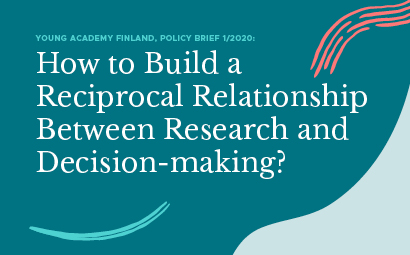The challenges concerning the Finnish and other European science advice mechanisms have been highlighted during the COVID-19 crisis of the spring of 2020. At the same time, science advice has proven to be undeniably important. In the future, the increase of such wicked problems as pandemics, climate change, and loss of biodiversity should be taken better into account, and the forms of interaction between science and policy should be reconsidered. It is important that sufficient investments are made now to increase the efficacy of science advice systems even further.
Sustainable, adaptable, and reliable science advice must be based on varied, transparent, partly overlapping, and genuinely multivoiced mechanisms that allow a presence also for early-career researchers.
Diversity must be one of the objectives for designing a science advice system. Diversity can be created for example by simultaneous unofficial and official models of interaction, as well as long-term and shorter-lived models. Unfortunately, an easy, overarching solution consisting of a single template or mechanism does not exist.
A reciprocal relationship between science and decision-making promotes knowledge-informed decision-making. Further, through multiple channels continuous interaction is enabled better also in times between urgent needs. Hereafter, the expertise and networks of national science academies, scientific associations, research organizations, and various boundary organizations could be used more effectively alongside the official science advice mechanisms linked directly with the government, complementing them.
Main messages of the Young Academy Finland Policy Brief 1/2020 are:
1. Increase reciprocal action between knowledge and decision-making
2. Support the inclusion of early-career researchers in the mechanisms of science advice
3. Transfer the responsibility for the performance of science advice from individuals to mechanisms
4. Develop and diversify the funding opportunities for science advice mechanisms
5. Base the development of science advice as a practice and its mechanisms on relevant research on the
relationship between science and policy


